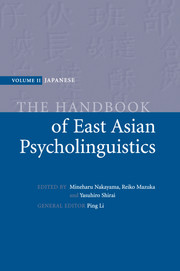Book contents
- Frontmatter
- Contents
- List of figures
- List of contributors
- In memory of Miwa Nishimura
- Preface
- Introduction
- Language acquisition
- 1 Ontogeny of language
- 2 Caregivers' speech
- 3 The intrinsic link between gesture and speech at the prelinguistic stage
- 4 Infant speech perception
- 5 Phonological acquisition
- 6 The mechanism of lexical development: implications from Japanese children's word learning
- 7 The acquisition of nouns and verbs in Japanese
- 8 The acquisition of verbal nouns
- 9 The acquisition of Japanese numeral classifiers
- 10 The acquisition of case markers
- 11 The acquisition of tense and aspect
- 12 On the origin of children's errors: the case of Japanese negation and direct passive
- 13 Binding Theory in UG and first-language acquisition of Japanese
- 14 The acquisition of the particles ne, yo, and no
- 15 The acquisition of linguistic politeness in Japanese
- 16 Children's narrative structures
- 17 Memory talk and testimony in children
- 18 Developmental dyslexia
- 19 Japanese Sign Language
- 20 The role of an innate acquisition device in second-language acquisition
- 21 Japanese, the grammar of reflexives, and second-language acquisition
- 22 Processes in L2 Japanese sentence production
- 23 The development of lexical competence among second-language readers
- 24 Reading in Japanese as a second language
- 25 Intrasentential code-switching in Japanese and English
- Part II Language processing
- References
- Name index
- Subject index
13 - Binding Theory in UG and first-language acquisition of Japanese
from Language acquisition
Published online by Cambridge University Press: 05 June 2012
- Frontmatter
- Contents
- List of figures
- List of contributors
- In memory of Miwa Nishimura
- Preface
- Introduction
- Language acquisition
- 1 Ontogeny of language
- 2 Caregivers' speech
- 3 The intrinsic link between gesture and speech at the prelinguistic stage
- 4 Infant speech perception
- 5 Phonological acquisition
- 6 The mechanism of lexical development: implications from Japanese children's word learning
- 7 The acquisition of nouns and verbs in Japanese
- 8 The acquisition of verbal nouns
- 9 The acquisition of Japanese numeral classifiers
- 10 The acquisition of case markers
- 11 The acquisition of tense and aspect
- 12 On the origin of children's errors: the case of Japanese negation and direct passive
- 13 Binding Theory in UG and first-language acquisition of Japanese
- 14 The acquisition of the particles ne, yo, and no
- 15 The acquisition of linguistic politeness in Japanese
- 16 Children's narrative structures
- 17 Memory talk and testimony in children
- 18 Developmental dyslexia
- 19 Japanese Sign Language
- 20 The role of an innate acquisition device in second-language acquisition
- 21 Japanese, the grammar of reflexives, and second-language acquisition
- 22 Processes in L2 Japanese sentence production
- 23 The development of lexical competence among second-language readers
- 24 Reading in Japanese as a second language
- 25 Intrasentential code-switching in Japanese and English
- Part II Language processing
- References
- Name index
- Subject index
Summary
Overview
The theory of Universal Grammar (UG) proposes a theory of universal principles that underlie all natural languages and, at the same time, a theory of the Initial State of the human organism, i.e. a Language Faculty in the human species which exists prior to experience, making language acquisition possible (Chomsky, 1981). One strength of this theory is that it formulates specific components of the Language Faculty which can be subjected to empirical testing. One component has been formulated in terms of “Binding Theory” (BT) (e.g. Chomsky, 1981), which concerns relations of anaphora between various forms of pronominal expressions and their antecedents (e.g. Lust 1986).
BT concerns a basic distinction in nominal and pronominal expressions in natural languages: they may either be “free” (or “referential”), they may refer to elements in the world freely (e.g. (1)), or be “bound” (e.g. (2a)), i.e. have their interpretation obligatorily determined by linguistic antecedents within the sentence in which they appear, thus overriding the referential possibilities of the nominal form. The basic discovery underlying the BT was that the syntactic structure of the sentence was found to determine this distinction between free and bound anaphora, at least partially. For example, the configurational relation of “c-command” of one element by another in the hierarchical structure of a sentence and the notion of “governing category” (a measure of syntactic locality) were found to allow certain nominal interpretations and also provide constraints on them.
- Type
- Chapter
- Information
- The Handbook of East Asian Psycholinguistics , pp. 98 - 102Publisher: Cambridge University PressPrint publication year: 2006

